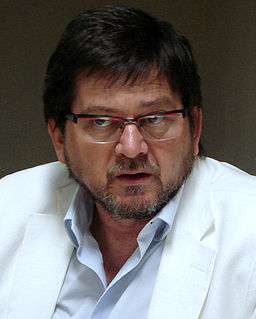
Francisco Buarque de Hollanda, popularly known simply as Chico Buarque, is a Brazilian singer-songwriter, guitarist, composer, playwright, writer, and poet. He is best known for his music, which often includes social, economic, and cultural reflections on Brazil.

Lygia Fagundes da Silva Telles is a Brazilian novelist and writer. Educated as a lawyer, she began publishing soon after she completed high school and simultaneously worked as a solicitor and writer throughout most of her career. She is a recipient of the Camões Prize, the highest literary award of the Portuguese language and her works have received honors and awards from Brazil, Chile and France. She was elected as the third woman in the Brazilian Academy of Letters in 1985 and holds Chair 16.

Antônio Drauzio Varella is a Brazilian doctor, educator, scientist and medical science popularizer in the press and TV, as well as best-selling author. In addition to medicine, Varella is a public commentator on issues such as prison conditions, social welfare, government, literature and his professed atheism and skepticism.
Frederico Barbosa is a Brazilian poet.
Luiz Fernando Carvalho is a Brazilian filmmaker and television director, known for works closely linked to literature that constitute a renovation in Brazilian audiovisual aesthetics. He has already brought to the screen works by Ariano Suassuna, Raduan Nassar, Machado de Assis, Eça de Queirós, Roland Barthes, Clarice Lispector, Milton Hatoum, José Lins do Rego and Graciliano Ramos, among others.
Sérgio Luiz Viotti was a Brazilian actor and television director.

Antonio Nóbrega is a Brazilian singer, dancer and actor whose work features cultural traditions from Pernambuco.

Tatiana Salem Levy is a Brazilian writer and translator.

The São Paulo Prize for Literature is a Brazilian literary prize for novels written in the Portuguese language and published in Brazil. It was established in 2008 by the Secretary of Culture for the State of São Paulo. Though not as old as other literary prizes in Brazil, such as the Machado de Assis Prize, the São Paulo Prize has quickly risen in prestige. For example, in 2011, there were 221 submissions for the prize. This rapid rise in popularity is partly because of the large cash prize. Every year two prizes of R$200,000 each are awarded—one for the best novel of the year by an established author, and the other for the best novel of the year by a debut author—making the São Paulo Prize the largest prize for a published work in Brazil, and one of the largest literary prizes in the world. Ten finalists are listed for each award, during the Festival da Mantiqueira, and the winners are announced on the first Monday of August in the Museum of the Portuguese Language.

Laurentino Gomes is a Brazilian journalist and writer. He is best known as the author of the trilogy of books that cover the history of Brazil and Portugal during the 19th century. He has already released two of the three books: 1808, about the transfer of the Portuguese Court to Brazil; and 1822, about the Independence of Brazil. He is about to release the third and final book of the series, 1889, about the Proclamation of the Republic.

Luiz Fernando Ruffato de Souza is a contemporary Brazilian writer. An alumnus of the Federal University of Juiz de Fora in the Brazilian state of Minas Gerais, Ruffato worked as a journalist in São Paulo and published several fiction books including Historia das Remorsos e Rancores (1998) and Eles eram muitos cavalos [They were Many Horses] (2001). The latter book garnered the APCA literary prize.

Milton Hatoum is a Brazilian writer, translator and professor. Hatoum is one of Brazil's most eminent contemporary writers. Among other honors, Hatoum was awarded Brazil's most prestigious literary award, the Jabuti Prize, three times for best novel. In 2017, he received the title of Officier de L'Ordre des Arts et des Lettres from the French government.

Boris Fausto is a Brazilian historian, political scientist and writer.
João Antônio Ferreira Filho was a Brazilian journalist and short story writer, who became known for portraying the lives of marginalized people inhabiting the outskirts of large cities, such as bandits, workers, vagrants and malandros.

Marçal Aquino is a Brazilian novel writer, screenwriter and journalist.
Edla Van Steen was a Brazilian journalist, actress and writer.
Izaías Almada is a Brazilian novelist, playwright, and screenwriter. In 1963 he moved to the city of São Paulo where he worked in theater, journalism, TV advertising, and script writing. Between the years of 1969 and 1971, he was a political prisoner of the military coup in Brazil that took place in 1964.

Celso Frateschi is a Brazilian actor, director, author and politician.
Klévisson Viana is a Brazilian cordel literature poet, comics artist and editor. In 1995 he founded the Tupynanquim publishing house, specialized in comics and cordel. He is also a member of the Brazilian Cordel Literature Academy. He started working as illustrator in 1988, at the age of 15, in the newspaper A Voz do Povo, in Canindé. He won the Troféu HQ Mix three times: best national graphic novel in 1999, best adventure and fiction magazine in 2001 and best national special edition in 2004. Viana also won the third place in Prêmio Jabuti in 2014 with the adaptation of The Guarani in cordel.












